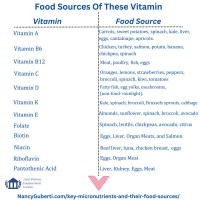
Micronutrients are essential vitamins and minerals that our bodies need in small amounts to function properly. While they do not provide energy like macronutrients (carbohydrates, proteins, and fats), they play crucial roles in metabolism, immunity, and overall well-being. A diet rich in diverse whole foods ensures adequate intake of these vital nutrients. Below, we explore key micronutrients, their benefits, and the best food sources to obtain them.
Vitamin A
Vitamin A is crucial for vision, immune function, and skin health. It is found in both animal-based and plant-based sources.
Food Sources: Carrots, sweet potatoes, spinach, kale, liver, eggs, cantaloupe, apricots.
Benefits: Supports eye health, boosts immune function, and aids in cell growth and reproduction.
Vitamin C
A powerful antioxidant, vitamin C helps with collagen production, wound healing, and immune function.
Food Sources: Oranges, lemons, strawberries, bell peppers, broccoli, spinach, kiwi, tomatoes.
Benefits: Enhances iron absorption, promotes healthy skin, and strengthens the immune system.
Vitamin D
Essential for calcium absorption, vitamin D plays a vital role in bone health and immune function.
Food Sources: Fatty fish, egg yolks, fortified milk, fortified plant milks, mushrooms, sunlight.
Benefits: Supports strong bones, improves mood, and strengthens immunity.
Vitamin E
An important antioxidant, vitamin E protects cells from damage and supports immune health.
Food Sources: Almonds, sunflower seeds, spinach, broccoli, avocado, wheat germ.
Benefits: Promotes skin health, supports immune function, and protects against oxidative stress.
Vitamin K
Vitamin K is essential for blood clotting and bone metabolism.
Food Sources: Kale, spinach, broccoli, Brussels sprouts, cabbage, fermented foods.
Benefits: Supports bone health, aids in blood clotting, and may reduce the risk of heart disease.
Vitamin B6
Vitamin B6 is involved in brain development, immune function, and amino acid metabolism.
Food Sources: Chicken, turkey, salmon, potatoes, bananas, chickpeas, fortified cereals, spinach.
Benefits: Supports brain health, helps with neurotransmitter function, and aids in metabolism.
Vitamin B12
Essential for red blood cell production and neurological function, vitamin B12 is primarily found in animal-based foods.
Food Sources: Meat, poultry, fish, eggs, dairy, fortified cereals.
Benefits: Supports nerve function, prevents anemia, and enhances brain health.
Calcium
Calcium is necessary for strong bones, muscle function, and nerve transmission.
Food Sources: Dairy products, leafy greens, fortified plant milks, tofu, almonds, broccoli.
Benefits: Strengthens bones and teeth, aids in muscle contraction, and supports cardiovascular function.
Iron
Iron is a key component of hemoglobin, which carries oxygen in the blood.
Food Sources: Red meat, poultry, fish, lentils, beans, tofu, quinoa, spinach, fortified cereals.
Benefits: Prevents anemia, boosts energy levels, and supports cognitive function.
Folate (Vitamin B9)
Folate is crucial for DNA synthesis, cell division, and fetal development.
Food Sources: Spinach, lentils, chickpeas, beans, fortified cereals, avocado, citrus fruits.
Benefits: Supports brain function, reduces the risk of neural tube defects, and promotes heart health.
Selenium
Selenium is an essential mineral with antioxidant properties that support thyroid function and immunity.
Food Sources: Brazil nuts, tuna, sardines, poultry, eggs, sunflower seeds, whole grains.
Benefits: Supports thyroid health, boosts immunity, and protects against oxidative damage.
Zinc
Zinc is vital for immune function, wound healing, and DNA synthesis.
Food Sources: Beef, lamb, pork, oysters, chickpeas, lentils, pumpkin seeds, almonds, cheese, yogurt.
Benefits: Enhances immune response, promotes wound healing, and supports reproductive health.
Iodine
Iodine is necessary for thyroid hormone production and metabolic function.
Food Sources: Seaweed, seafood, iodized salt, dairy, eggs.
Benefits: Supports thyroid function, regulates metabolism, and promotes cognitive health.
Sodium
Sodium plays a role in fluid balance, nerve function, and muscle contractions.
Food Sources: Table salt, processed foods, cheeses, pickles, olives, soy sauce.
Benefits: Regulates blood pressure, maintains electrolyte balance, and supports nerve signaling.
Fatty Acids (Omega-3 & Omega-6)
Essential fatty acids support brain function, heart health, and inflammation control.
Food Sources: Fatty fish (salmon, mackerel), flaxseeds, chia seeds, walnuts, sunflower oil, olive oil, avocado.
Benefits: Reduces inflammation, supports brain health, and lowers the risk of heart disease.
Dietary Fiber
Fiber aids digestion, regulates blood sugar, and supports a healthy gut microbiome.
Food Sources: Whole grains, legumes, fruits, vegetables, nuts, seeds.
Benefits: Promotes digestive health, aids in weight management, and reduces cholesterol levels.
Lean Protein
Protein is essential for muscle repair, enzyme function, and overall cellular health.
Food Sources: Chicken, turkey, salmon, tuna, eggs, legumes, tofu, tempeh, Greek yogurt, cottage cheese.
Benefits: Builds and repairs tissues, supports metabolic health, and enhances satiety.
Final Thoughts
A well-balanced diet that includes a variety of nutrient-dense foods ensures optimal health and well-being. By consuming foods rich in essential vitamins and minerals, you support your body’s natural functions and enhance overall vitality. Consider incorporating a diverse range of fruits, vegetables, whole grains, lean proteins, and healthy fats to meet your micronutrient needs. If you suspect a deficiency, consult a healthcare professional or nutritionist for guidance on dietary adjustments or supplementation.
By focusing on whole foods and a nutrient-rich diet, you can optimize your health and longevity while reducing the risk of chronic diseases.
Stop guessing what your body needs and gain insight into your how your body is functioning internally and where the imbalances are, and find out what your body really needs for you.
Test don’t guess anymore.
Tags: Autism Training, Certified Autism Health Coach, Certified Health Coach Training, Food Sources for Vitamins, functional medicine lab testing, Micronutrients, Nancy Guberti, Total Wellness Empowerment Institute, Vitmoan C
Leave A Reply (No comments So Far)
No comments yet